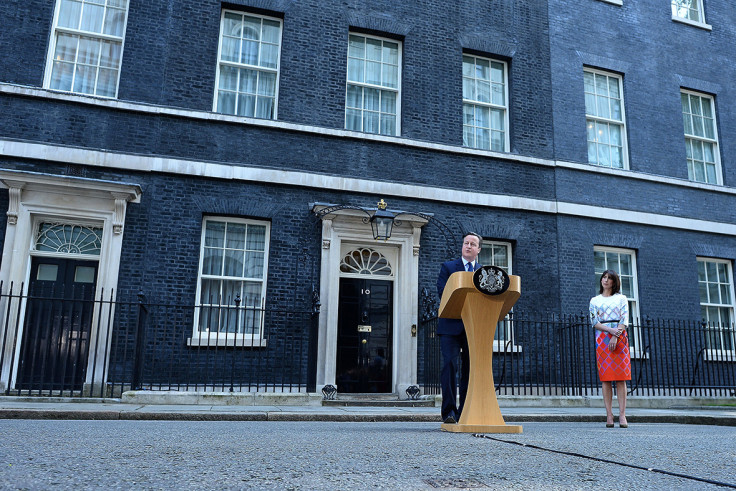Brexit: Cameron's great referendum gamble has backfired disastrously
For the first time in our history, the UK government has been forced down a road it doesn't want to follow.
Oh, what a night! What a cliffhanger. What a heart-thumping, gut-wrenching, roller-coaster of a ride as hour by hour, declaration by declaration, the Leave campaign clung to its narrow but decisive lead until at last the outcome was beyond doubt and Britain woke to a whole new world.
Now we find ourselves in uncharted waters. Terra incognita. For the first time in our history, the Government of this country has been instructed by the people to go down a road it passionately doesn't want to follow. A pro-EU Parliament is under orders to pass Brexit legislation with which it profoundly disagrees.
In the wider world, meanwhile, there is shock and disbelief. The pound is in free fall, collapsing further and faster even than in the financial crash of 2008. Share markets are in turmoil.
Big investors who gambled so heavily in a Remain victory have lost billions. Politicians across Europe speak of a body blow to an EU already struggling with the migration crisis and problems in the eurozone.
What next? Nobody knows. In Scotland, where they voted by an overwhelming majority to Remain, the question of another independence referendum is now very much back on the agenda.
In Ulster, Sinn Fein's Martin McGuinness wants a poll on the issue of a united Ireland. And in London, after David Cameron's emotional announcement of his impending departure, we now have something approaching a political vacuum.
Of course the Prime Minister must go, even though his sense of duty has persuaded him to soldier on for a few more months, until the storm subsides. It certainly wouldn't be wise to have a Tory leadership contest in the midst of all the current instability.
But it can't be denied that he had made catastrophic miscalculations. His great gamble in calling the referendum – a gamble he didn't need to risk, made only to pacify eurosceptic Tories and see off Ukip – backfired disastrously.

Then there is the way he chose to conduct this campaign. Like a gigantic wrecking ball, the referendum smashed the civilised restraints that helped keep the Tories together. All those half-truths, threats and personal attacks have left wounds that won't be easily healed.
And consider the way he and George Osborne repeatedly talked the economy down. Prime Ministers and Chancellors should never, never resort to the language of doom and gloom. Such behaviour would once have seemed inconceivable. Almost treacherous, in fact. But that didn't stop the pair of them issuing a series of hysterical warnings of what might happen in the the event of a Brexit.
No doubt the money markets would have reacted badly anyway to the outcome of the vote. But would that reaction have been quite so violent if Messrs Cameron and Osborne had shown more responsibility and restraint? I wonder. It's certainly the case that the two most senior figures in the Government seem sadly diminished today.
We should begin by calming down...the collapse of sterling is worrying. But the volatility will certainly subside.
But if the Tories are in a mess, Labour's state is arguably even worse. While claiming to be enthusiastically pro-Europe, it proved pitifully irrelevant in this debate. With a lifetime of hostility to Brussels behind him, Jeremy Corbyn's pretence of support for the Remain side was laughably unconvincing, to the despair of his own backbenchers.
Much more dangerously, this campaign has revealed a party hopelessly put of touch with the people it claims to represent. Millions in the traditional Labour heartlands feel ignored by the political establishment, threatened by globalisation and unrestricted EU immigration, that they have no voice and no status in their own country. And Labour's response?
At one stage in this campaign, Mr Corbyn insisted that all mention of immigration should be removed from a Labour leaflet. Evidently the politically-correct, right-on instincts of the metropolitan political elite matter far more than anything ordinary voters might think.
How we cope in future will depend not on what happened in the referendum, but on how skilfully we can negotiate a new relationship with our partners.
Haven't we been here before? Not so long ago, Labour ruled the roost in Scotland, until its own supporters grew sick of its complacency, arrogance and incompetence. Today the party languishes in third place in the Holyrood parliament, behind the SNP and the Tories. Can anyone doubt that it risks a similar wipeout in England, under the self-satisfied leadership of Mr Corbyn?
But such considerations are for another day. For now, the political priority must be to find ways of steering our way through the difficult days ahead. And perhaps we should begin by calming down.
Yes, the collapse of sterling is worrying. But the volatility will certainly subside. Our currency will settle down. And anyway, aren't there export advantages in a lower pound?
Meanwhile, nothing has actually changed. We're still in the EU. We'll keep our membership for at least a couple of years. How we cope in future will depend not on what happened in the referendum, but on how skilfully we can negotiate a new relationship with our partners. So don't panic. It's all to play for.
After all, didn't Mr Cameron himself once say that Britain would do perfectly well outside the EU?
© Copyright IBTimes 2024. All rights reserved.







